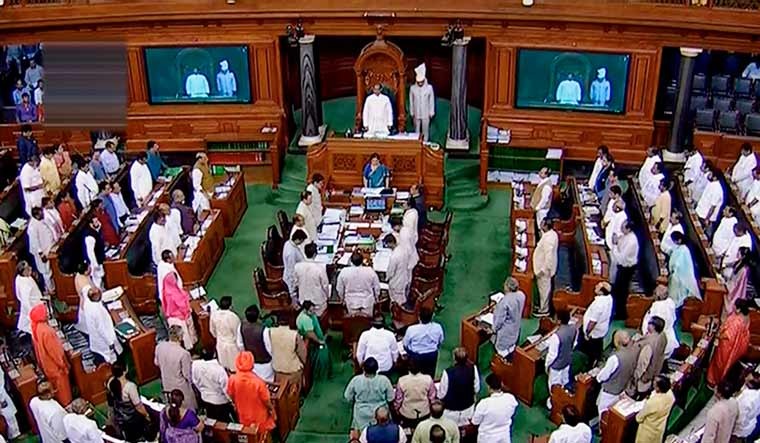Lok Sabha Observes Silence to Honor Victims of Pahalgam Attack and Air India Crash, Reflecting National Grief and Resolve
In a recent session of the Lok Sabha, members came together in a solemn moment of silence to honor the victims of two heart-wrenching tragedies that have deeply affected the nation. The chamber fell silent, its usually lively debates paused, as parliamentarians reflected on the pain and loss endured by families torn apart by the Pahalgam terror attack and the devastating Air India crash.
NATIONAL
Thinkbrief
7/21/20253 min read


In a recent session of the Lok Sabha, members came together in a solemn moment of silence to honor the victims of two heart-wrenching tragedies that have deeply affected the nation. The chamber fell silent, its usually lively debates paused, as parliamentarians reflected on the pain and loss endured by families torn apart by the Pahalgam terror attack and the devastating Air India crash.
The Pahalgam attack happened earlier this year in the picturesque meadows of Jammu and Kashmir, where tourists had gathered to enjoy the serene landscape. What was meant to be a day of peace and natural beauty turned into a nightmare when militants launched a violent assault. Twenty six people lost their lives in that sudden tragedy twenty five Indian citizens and one visitor from Nepal. The memory of that violent day still lingers heavily, not just in the valley but across the country. In the Lok Sabha, as the Speaker shared words of sorrow, members lowered their heads in collective grief, honoring those innocent lives taken so abruptly.
Just weeks later, another tragedy gripped the nation. An Air India flight bound for London crashed shortly after takeoff, killing over two hundred passengers along with nearly thirty people on the ground. The sheer scale of the disaster sent shockwaves through India and beyond. Families waiting at destinations far from home were left with an unbearable void. In Parliament, the weight of this sorrow was palpable as members paused to remember each life lost in the crash. Leaders and citizens alike have expressed their condolences, and the tragedy has drawn international sympathy with figures such as Britain’s King Charles the Third marking moments of remembrance.
During these moments of silence, the usual political divisions softened. The grief transcended party lines, uniting parliamentarians in a shared humanity. The quiet in the chamber was profound, a space where words seemed inadequate, and the simple act of pausing became a powerful gesture of empathy. For those brief minutes, every member of Parliament seemed to silently promise that these lives would not be forgotten.
But the moments of silence were not merely symbolic. They were accompanied by urgent calls for action. Many members stressed the importance of improving security in tourist areas like Pahalgam so that visitors might feel safe and families could enjoy their time without fear. They also urged the government to strengthen intelligence networks and counterterrorism efforts to prevent such attacks from happening again.
Similarly, in the wake of the Air India tragedy, Parliament demanded a thorough investigation into the causes of the crash. Questions were raised about airline safety standards, maintenance protocols, and the preparedness of emergency response teams. Members stressed that transparency and accountability were crucial not only to bring closure to grieving families but to prevent future disasters. The tragedy highlighted vulnerabilities in aviation safety that India must address with urgency.
These twin tragedies, while very different in nature, have forced the nation to confront painful realities about safety, security, and resilience. The moments of silence in the Lok Sabha served as a reminder that behind every statistic is a human story a family shattered, dreams cut short, and a community left to mourn.
In these shared moments of mourning, the Parliament expressed a collective commitment. The silence was a pledge that India would not only remember but would work tirelessly to ensure safer skies and more secure lands. It was a reminder that national strength is measured not only in economic or military power but in the ability to protect its people from harm and to heal when tragedy strikes.
As life gradually moves forward, the echoes of those quiet moments linger. They are gentle calls to vigilance, compassion, and action. The losses suffered in Pahalgam and the Air India crash are etched deeply into the nation’s memory, urging lawmakers and citizens alike to build a safer future.
Ultimately, the Lok Sabha’s tribute was a testament to the resilience of a nation that honors its dead by striving to protect the living. In grief, there is solidarity in silence, a resolve. And in remembrance, a hope that such moments of mourning will someday become rare, replaced instead by celebrations of life and safety for all.